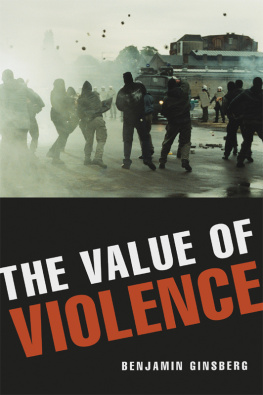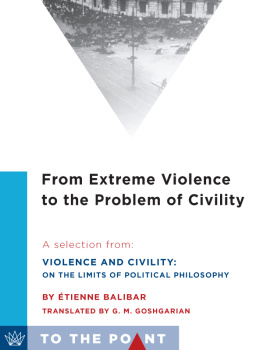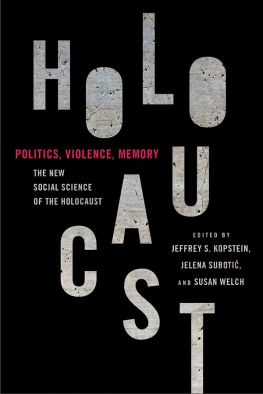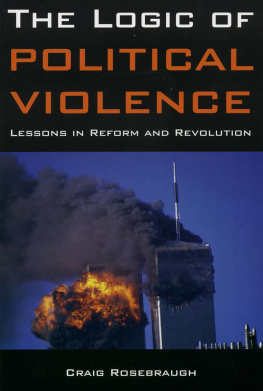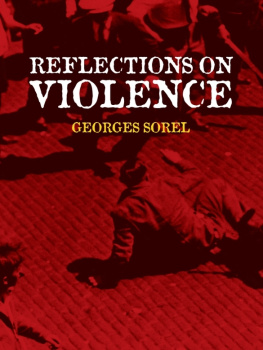
In writing this book I benefited from many faculty club discussions with colleagues from diverse fields, including Matthew Crenson, Howard Egeth, John Irwin, and Robert Kargon. I am also indebted to Alexander B. Ginsberg for contributing a good deal to my understanding of the legal and philosophical issues addressed in this book. Finally, I wish to thank the editorial staff at Prometheus Books, including Steven L. Mitchell, Julia DeGraf, and Catherine Roberts-Abel, and my agent, Claire Gerus, for helping me through the various stages of converting an idea into a book.


Recent events such as the Boston Marathon bombing remind us that violence is brutal and terrible. Yet, while we may shrink from violence we should not shrink from attempting to analyze and understand violence. A capacity for violence has always been an important facet of human nature. Humans, and perhaps their pre-human ancestors as well, have engaged in murder and mayhem, as individuals and in groups, for hundreds of thousands of years.
Academic discussions of the relationship between violence and politics fall into three main schools. Some authors see violence as instrumentally related to politics. Hobbes, for example, viewed violence as a rational means by which individuals sought to achieve such political goals as territory, safety, and glory.
Whatever their differences of emphasis, each of these perspectives assigns violence a subordinate role in political lifea secondary means of achieving Yet, our revulsion at the Chairman's practices should not blind us to the accuracy of his observation. Violence and the threat of violence are, in fact, the most potent forces in political life.
It is, to be sure, often averred that problems can never truly be solved by the use of force. Violence, the saying goes, is not the answer. This adage certainly appeals to our moral sensibilities. But whether or not violence is the answer presumably depends upon the question being asked. For better or worse, it is violence that usually provides the most definitive answers to three of the major questions of political lifestatehood, territoriality, and power. Violent struggle, in the form of war, revolution, civil war, terrorism, and the like, more than any other immediate factor, determines what states will exist and their relative power, what territories they will occupy, and which groups will and will not exercise power within them.
In the case of statehood, there are occasional circumstances under which a state may be built by and endure mainly through peaceful means. These are, however, the rather rare exceptions. As Charles Tilly has observed, most of today's regimes are the survivors or descendants of a thousand-year-long culling process in which those states capable of creating and sustaining powerful military forces prevailed, while those that could not or would not fight were conquered or absorbed by others.
In some instances, of course, those deprived of their land raise serious objections and moral questions. Ongoing land disputes are particularly manifest in today's Middle East, where the Israelis are accused of pursuing an ongoing policy of stealing Arab land. Indeed, it is often asserted by Palestinians and by other Arabs and their left-liberal supporters in the West that the very existence of the State of Israel represents an illegitimate theft of Arab land. The creation of the State of Israel is seen in these quarters as a supreme tragedy or catastrophe (al nakba in Arabic). Certainly, one can make this argument. Indeed, Arabs and Jews and possibly others, as well, have historic, religious, and legal land claims in the Middle East that merit attention. Yet, Jewish assertions of rightful ownership of the land of Israel do not seem any more or less lacking in legitimacy than any other contemporary territorial claims. It hardly needs to be said that the United States occupies millions of square miles of territory stolen from the Native Americans as well as land taken by force from the Mexicans whose Spanish forebears had previously stolen it from Native Americans. The ancestors of the modern-day Europeans stole their land too. But since these land thefts occurred long ago, the rightful ownership of Western European territory is only occasionally contested these days. In the case of America, the original land owners were largely exterminated by the European settlers and, so, are not in a position to press their claims with much vigor.
The main difference between the Israelis and other contemporary land owners might seem to be that Israel has only existed as a state for a few decades. Israel, moreover, unlike the United States and others, failed to launch a sustained campaign of annihilation against the previous land owners who therefore remain quite able to vocally and violently assert their irredentist claims. Should Israel, however, deserve relegation to the status of a pariah for having been insufficiently murderous? Those nations currently occupying lands whose previous inhabitants they exterminated might seem more blameworthy than those who did not pursue a genocidal program. The point here is not to absolve Israel from reproach but is, rather, to point to the many moral ambiguities surrounding questions of land ownership. The fact of the matter, however unfortunate it may seem, is that territory belongs to whatever group is able to seize and hold it.
In the case of power, within every state the composition of the ruling class, if not always the identity of the particular rulers, is generally shaped by the use or threat of what Walter Benjamin called law-making violence.centuries does not contravene this last point. Barack Obama, America's first black president, was chosen at the polls. The possibility, however, that a black person could become a member of America's social and political elite was established through sometimes violent and often disruptive protest four decades earlierto say nothing of the bloody war fifteen decades earlier that freed black people from chattel slavery.
Generally speaking, electoral politics is an arena in which success requires substantial economic, institutional, educational, and organizational resources. Consequently, elections in the Western world are usually fought among competing factions of the bourgeoisiea social stratum whose power was established in a series of violent struggles that began in Europe in the seventeenth century..
In the United States over the past two centuries those elected to high political office have mainly been individuals drawn from the middle and upper classes.
Once the basic questions of statehood, territoriality, and power are answered, subsidiary matters might be addressed without a resort to force. But whether some form of peaceful political discourse is likely to emerge in the aftermath of a violent struggle depends in no small measure upon the decisiveness of the struggle's outcome. Decisiveness refers to the relationships among the winners and losers that emerge in the wake of a violent political conflict. An outcome is most decisive when a more or less unitary actor, such as an organized political party, nation-state, revolutionary army, or similar entitysay, the Bolsheviks or Chinese Communist Partyachieves a complete and clear-cut victory over its foes. Decisiveness is reduced when the nominal losers retain the ability to renew hostilities at some future date, or when victory is shared by a loosely knit alliance or coalition whose members relationships to one another have as yet to be determined.
Next page
